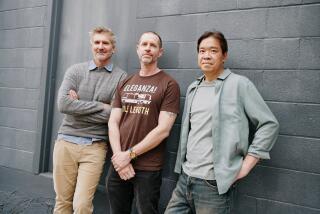TV REVIEWS : ‘China’ Examines Slice of City’s Evolution
- Share via
In the first few minutes of Phil Agland’s two-part, four-hour film “China: Beyond the Clouds,” the perpetually snow-capped Jade Dragon Mountain towers above the small city of Lijiang like an ancient sentinel. Agland’s wide-screen landscapes (broadcast in letterbox) suggest that the gigantic vistas of southwest China will dwarf the petty concerns of the people of the Lijiang area.
It might have been so in traditional Chinese scroll painting, in which landscape and people had equal importance. But Agland, who is British, zooms in on the people, and he finds himself a welcome visitor.
Agland shoots the daily and dramatic events of a few of the area’s families with the clinical observation of filmmaker Frederick Wiseman, only lit with the artfulness of Vermeer. This is one of the few television series all year that could be shown on a movie screen; indeed, Agland’s film seems crimped by the small tube.
What emerges is a social tapestry of a slice of China in the 1990s, in which old ways uneasily coexist with new troubles ranging from unemployed youth to increased heroin-related crime. Lijiang even has an “old town” and a “new town”--the former the home of traditionalists like the kindly Dr. Tang and the short-tempered butcher (and ostensible central character) Mr. Mu. The latter is popular with kids at night, but the bars have become drug centers, and trouble eventually erupts.
By Los Angeles standards, the gang murder of 17-year-old Asan (Mu’s nephew) is very mild stuff. In a culture like China’s so recently under tight security controls, though, the crime sends shock waves across Lijiang. Just as Victor Hugo used a crime plot to examine social conditions, Agland studies the town--and Chinese national policy--through Asan’s tragedy: The flawed police and court system, the new lenient policies toward juveniles, the rising popularity of capital punishment, the frustrations of a grieving family facing a bureaucracy (Mu’s harsh treatment by hospital staff makes U.S. health care look heavenly).
Even with four hours, Agland takes on more than he can handle, cutting back and forth across several families, including the Lu family who live in the mountains above Lijiang. The Lus are part of the Yi ethnic minority group, enslaved until the 1950s and now able to send their children to only one secondary school in town. We’re seldom able to dwell upon any family member for long in Agland’s overly ambitious cinematic embrace, but such facts remind how medieval China recently was.
With narrator Lisa Lu’s lilting voice and George Fenton’s lyrical flute theme coursing through it, “China: Beyond the Clouds” comes dangerously close to prettifying a country enduring a harsh evolution. It is intimate, but big as it is, this film isn’t the whole picture.
More to Read
The complete guide to home viewing
Get Screen Gab for everything about the TV shows and streaming movies everyone’s talking about.
You may occasionally receive promotional content from the Los Angeles Times.






